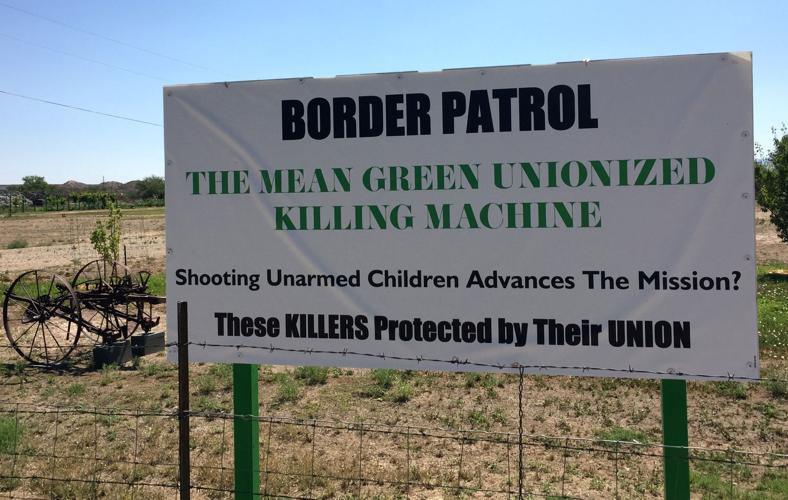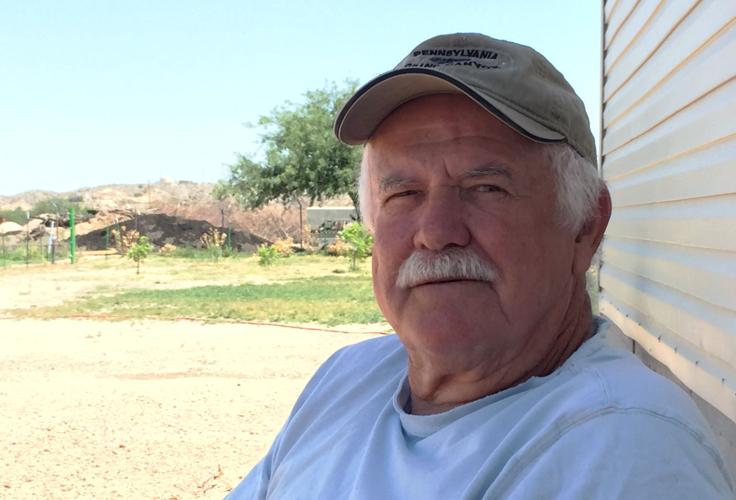People have put up anti-Border Patrol signs in Southern Arizona before, bashing the agency or telling agents not to trespass.
But a new sign, along the highway in St. David, is the first I’ve heard of that targets the agents’ union, the National Border Patrol Council.
“BORDER PATROL” the sign shouts at the top.
“THE MEAN GREEN UNIONIZED KILLING MACHINE”
“Shooting Unarmed Children Advances The Mission?”
“These KILLERS Protected by Their Union”
Some might consider the over-the-top banner a danger sign for the union that represents about 3,500 agents in Southern Arizona and about 16,000 nationwide. Who wants to have such angry enemies? But another way to look at it is this: The union is forcing people to reckon with it, even if it’s done so by embracing rhetoric and allies that turn off a swath of the public.
Over the last few years, the National Border Patrol Council has become increasingly outspoken on political issues, especially immigration enforcement. This year, the union reinforced that stance by endorsing Pinal County Sheriff Paul Babeu for U.S. House in Congressional District 1 and Donald Trump for president.
They’re risky moves for a federal union that has achieved some remarkable successes in recent years. Perhaps most important, the union got the Border Patrol Pay Reform Bill through Congress in 2014. That ensured agents a simplified system for overtime pay.
More recently, the union has forced Customs and Border Protection Commissioner Gil Kerlikowske to explain policies telling agents to release people who have been here illegally since before 2014. But as the year progresses, the union seems to be going beyond the grunt work of contracts, workplace complaints and administrative policies, risking some of its hard-won credibility on a particular strain of right-wing politics.
The sign in St. David, it turns out, was put up by a septuagenarian couple long involved in human-rights activism along the Arizona-Mexico border. James and Patricia Cooper participated in Humane Borders during the early 2000s before leaving the state for a few years, then returning in 2014.
They’re still unhappy with what they see as impunity for bad acts committed by agents. Seeing an agent at a local shop wearing a hat that referred to agents as “The Mean Green” is what inspired James Cooper to challenge them publicly.
“It’s an effort to tell the public they have some problems, and they’re more than just perception,” he said. “There is no justice in the Border Patrol.”
The tool they’ve chosen is ridicule.
“When you ridicule, you take away the fear,” said Patricia Cooper, who designed the sign using an online service. “When you take away the fear, you take away the power.”
But “shooting unarmed children”? Well, there have been a few questionable cases, most prominently the 2012 shooting of 16-year-old Jose Antonio Elena Rodriguez in Nogales, for which agent Lonnie Swartz was charged with murder. Still, agents rescue many, many times the number of children that have ever been shot.
“For somebody to put up a sign that says we’re killing children, that’s ridiculous,” said Art del Cueto, president of Local 2544 of the union, which represents agents in the Tucson sector.
Ironically, the Coopers’ sign actually plays into the union’s conception of itself: Defending agents from domestic criticism and administrative incompetence while protecting the country from foreign invaders. A vein of defensiveness against critics, such as the ACLU, human-rights groups and journalists, runs through the union’s regular podcast, “The Green Line.”
And its opening — the Night’s Watch oath from the TV show “Game of Thrones” — speaks to the self-image of the union as an unappreciated defender against lawlessness:
“Night gathers and my watch begins,” the oath starts. “It shall not end until my death. I shall take no wife, hold no lands, father no children. I shall wear no crowns and win no glory. I shall live and die at my post.”
With a self-image like that, no wonder the union is receptive to politicians like Trump. Del Cueto helped push the endorsement through the union’s executive committee.
Why? It’s not just the idea of a border wall. Del Cueto told me it was pretty persuasive when Trump called and asked for the union’s endorsement, pledging to include the union in border-related decisions.
And he noted that, while endorsing Trump in the primary was unprecedented, the union has endorsed many other candidates, even Democratic U.S. Rep. Ron Barber, before.
But that’s clearly not where the union’s political passion lies now. The union has presented itself as a truth-teller against Obama administration appointees who head its agency, picking sides in a partisan debate over the border, even as apprehensions remain historically low.
“This is not a liberal union,” host Shawn Moran said on “The Green Line” earlier this month. “It is a very conservative union.”
In fact, its endorsement of Trump sounded as much like an angry caller to a talk-radio program as it did a considered opinion representing 16,000 diverse federal employees:
“We need a person in the White House who doesn’t fear the media, who doesn’t embrace political correctness, who doesn’t need the money, who is familiar with success, who won’t bow to foreign dictators, who is pro-military and values law enforcement, and who is angry for America and NOT subservient to the interests of other nations. Donald Trump is such a man.”
Not all the agents were happy. In El Paso, the union local held a vote to decide whether to back out of the Trump endorsement, but that effort failed by a 14-13 vote.
The union’s increasing politicization also shows in its embrace of Babeu, a sheriff with a national profile but a lot of baggage. On Monday, Babeu warned travelers to western Pinal County that intelligence obtained by his department suggested that cartel hit men might be trying to confront “rip crews,” who steal drug loads from smugglers employed by trafficking organizations.
Gunplay in the desert could result, Babeu warned, so outdoor recreationists should go armed.
What were the grounds for Babeu’s warning? No other agency seemed to have any idea.
This is a pattern of Babeu’s — he warns of border violence only for the acts not to materialize. Back in August 2013, he predicted with mysterious specificity that sheriff’s deputies would have gun battles with traffickers within 30 to 60 days.
Last week, the day after his warning, Babeu tried to raise money for his congressional campaign off the alleged threat represented by his intelligence.
“It’s more urgent than ever, and I need your help,” he said in an email. “Can you give $10, $20, $50, or more today so I can continue my fight for secure borders?”
Babeu opponent Wendy Rogers, herself a Republican and Trump supporter, was among many who scoffed at the sheriff’s self-serving alarmism. But National Border Patrol Council President Brandon Judd defended the remarks, as did del Cueto, saying they reflected reality on the border.
And this is the problem with the position the union has placed itself in. It has gone beyond its perfectly sensible efforts to protect patrol-agent pay, defend agents from accusations of wrongdoing, and even question administrative dictates on immigration.
Instead, it has placed itself in a hard-right niche within the Republican Party. While that may serve its short-term interests by getting it attention and friends who are in political power now, at some point you wonder whether that sort of attention really serves the long-term interests of its members.





